#i also wish that baron had more character development cause like yeah
Explore tagged Tumblr posts
Text
dude i left lsodm because I was so scared because someone spoiled it to me and I didn’t want two of my comfort characters dying, until the end goes on for so long omg I just rushed through it so I could read hbl and val showed up I SO ANGRY LET IT BE ABOUT THE DEAD MEN. FOR ONCE.
Have I mentioned yet how much I love Hopeless? No? Well, that is a crime.
#hopeless fan club#i hate darquesse she should’ve just wiped the world#i also wish that baron had more character development cause like yeah#also where did Eliza go during phase 2#her boss shows up but she’s nowhere to be found??#WHY WAS THERE SO MUCH OF CREED I HATE HIM#damocles creed anti#we needed more of the unveiled siblings#also Martin Flannery was so ANNOYING
22 notes
·
View notes
Text
Tangled Salt Marathon - Beyond the Corona Walls Part 1
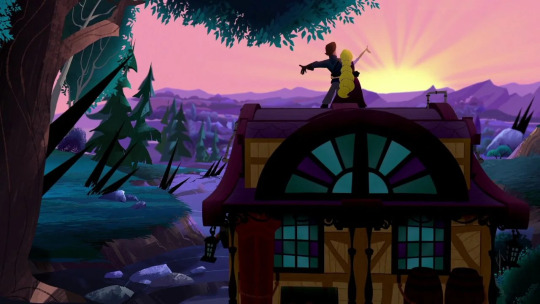
Ah, now we’re finally here at season two; the dullest season. Yet there’s still plenty to talk about so let’s dig in.
Summary: Rapunzel has begun following the Black Rocks and joining her on her journey are Eugene, Cassandra, Pascal, Maximus, Fidella, Owl, Lance, Hook Foot and Shorty (who stowed away). During this time, Eugene is planning on proposing to Rapunzel again, but when Rapunzel accidentally reveals herself when he is practicing it causes an awkward situation between the couple when Rapunzel doesn't give him an answer. Meanwhile, Rapunzel and the group are making their first stop in Vardaros, a city Eugene and Lance previously visited in their past, but discover it has become overrun with criminals. While Eugene and the boys remain in the city to gather supplies, news of Eugene's arrival quickly spreads among the citizens, including the city's leader, the Baron, a criminal kingpin who previously worked with Eugene and Lance in the past and seeks revenge. Eugene, Lance and Shorty are quickly captured by the Baron's men and taken to his castle where they met by the Baron and his daughter, Stalyan, Eugene's ex-fiancée. The Baron threatens Lance's life unless Eugene marries Stalyan. Meanwhile, Rapunzel and Cassandra meet Adira, a mysterious warrior who harbors knowledge on the Black Rocks.
The Audience Needs More Than Just Single Lines of Exposition
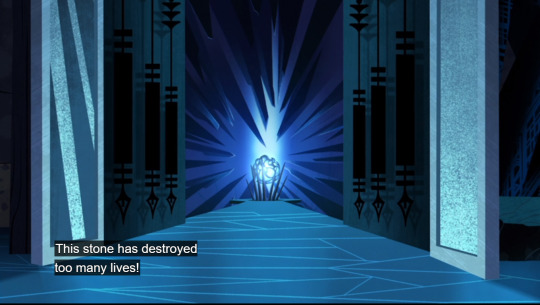
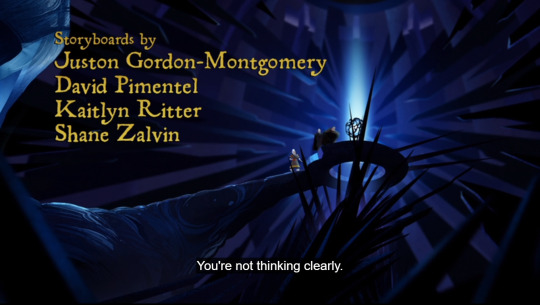
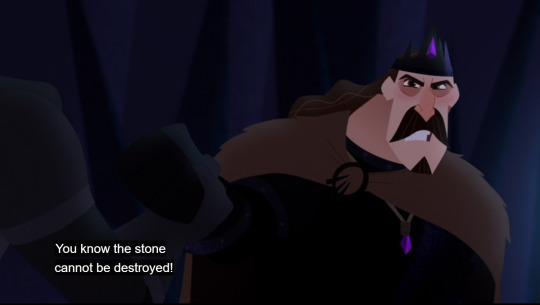
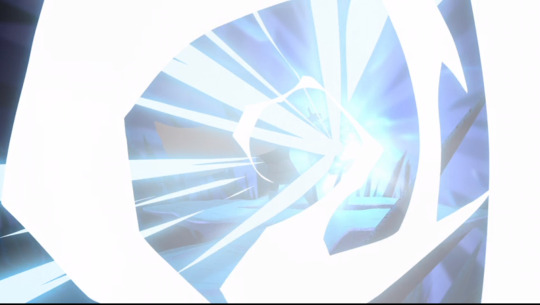
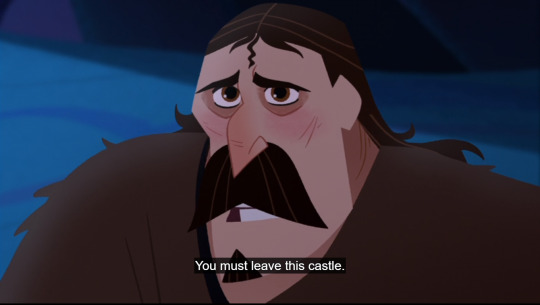
(Yes, that’s a lot of screen grabs and this is where a video review has the advantage, but I’m not fooling with editing, so there ya go.)
King Edmund of the Dark Kingdom here is talking about the moonstone and how he wishes to destroy it.
But how has it destroyed lives? What has it and the black rocks done besides some property damage? Why is he only now just considering this option when the moonstone has been there for centuries? Why leave to prevent people from using it, when the whole point of having a strong hold there is to safeguard it in the first place?
There’s lots that we can theorize here; I’m of the mind that his wife was impaled on a black rock, myself, hence his break down here; but the series doesn’t show us that. Telling us that the moonstone is a threat isn’t enough, you have to prove that it is. Cause right now only the rocks have been shown to cause damage and in this very same episode they stop being a threat and don’t do anything.
Well Looky There, Cass Got a Promotion
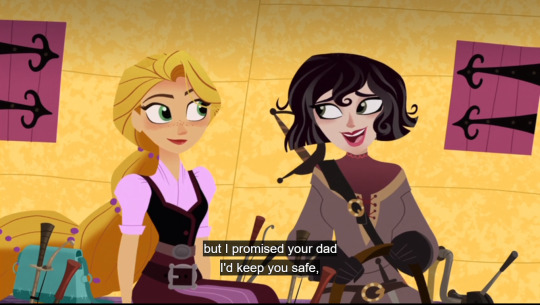
So this line, plus all of Cass’s previous guard duty work coupled with her protective nature this season, more or less cements that she was personally appointed by the king to be the princess’s bodyguard. She’s no longer a handmaiden.
Now watch as the show completely forgets this little plot point.
Why Are You Here Hookfoot?
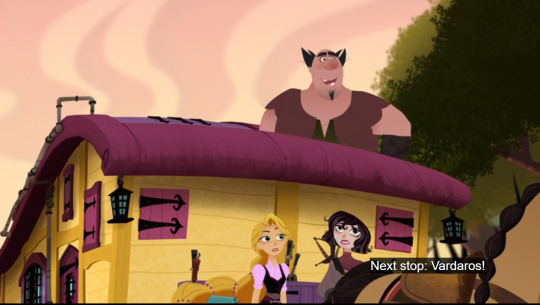
As I said earlier, I do like Hookfoot, and in theory I don’t mind him coming along to round out the group. But in practice he doesn’t really add anything. You could slot nearly any other character into his place and nothing would really change. In some cases, things would even improve without him.
Really Raps? More than Anyone?
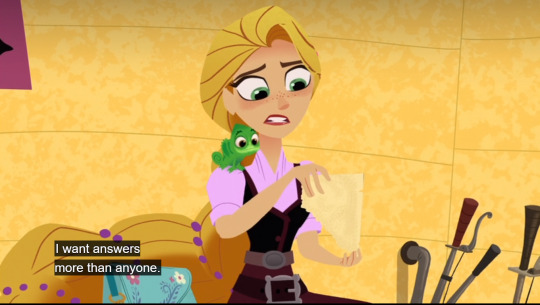
More than the poor orphaned boy that you stole that scroll piece from and threw into a dungeon? The one that spent months translating that scroll and trying to figure out the rocks while you sat on your ass and did nothing?
Oh, yeah, Varian is currently in jail by the way, and Rapunzel fully knows this, despite Frederick promising to try and help him.
I can understand the mains not letting Varian come along on this trip, but keeping the character who thus far has the most connection to your ongoing arc away from said arc entirely is bad storytelling. There were countless ways to incorporate Varian this season that didn’t involve hiding him away for a year. Including having him come along on probation, because he’s the only one who can read the your dang macguffin.
Marriage Isn’t a Trap, Stop Acting Like It Is
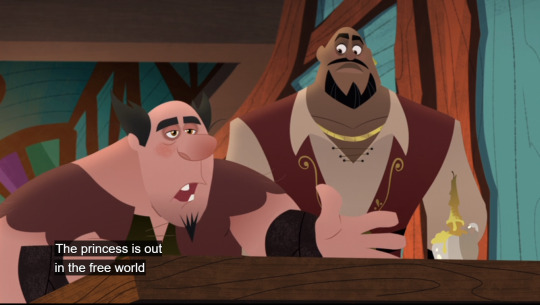
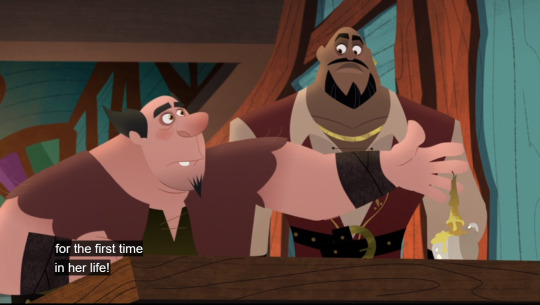
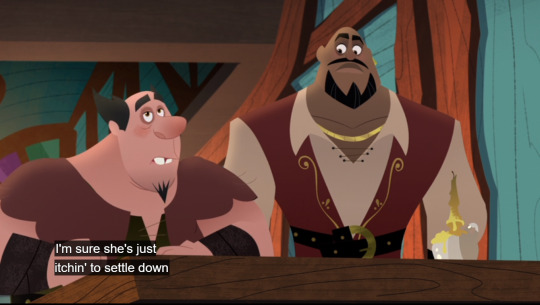
Marriage doesn’t stop you from living your life. You can be married and still do whatever it is that you enjoy. If it’s a healthy marriage then you and your partner will work together to help each other fulfill their dreams. Especially, when you got the money to do it, which, as royals, Eugene and Rapunzel both got in spades.
Also we aren’t even talking about getting married right now, just getting engaged. An engagement can last however long you want it to. There’s literally no reason why Rapunzel and Eugene couldn’t have been engaged, or even married, for the rest of the series.
I know you got a time frame show and this is suppose to lead into the Happily Ever After short, but then you need to give like an actual physical reason why they wouldn’t want to marry yet, cause otherwise you’re just spinning your wheels and wasting the audience’s time with this melodrama.
Why Are You Here Shorty?
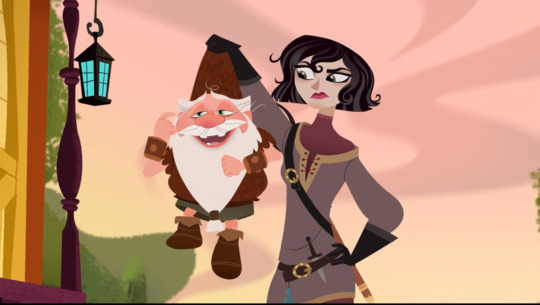
Shorty’s inclusion doesn’t bother me as much as Hookfoot’s. A. Because he’s a movie original and this is a spin off, and B. Shorty doesn’t take away anything. Including him doesn’t steal screen time from anybody else since he gets no real focus. It just also doesn’t add anything either since he gets no real focus. Your mileage may vary on how detrimental this is. It personally doesn’t bother me, but I’m not going to act like it’s great writing or anything either.
We Needed More of This
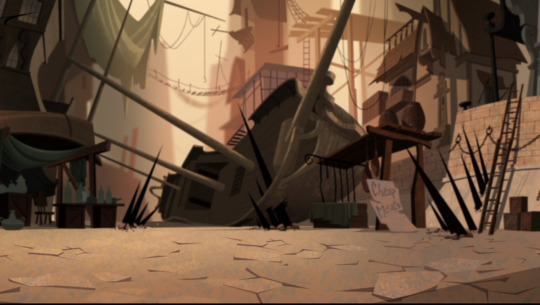
Remember how I said that there’s no longer any threat this season?
The rocks themselves could have been enough to push the narrative forward, same as they did in season one, if the series had bothered to show their destruction more often and claim that finding the moonstone could help fix things. But all we get is this one scene of a once prosperous town being junked. After that the story never focuses on it. The townspeople more or less get on with their lives, the rocks stop doing anything, and we see no more damage beyond this point.
Also keep in mind that we are never told what taking the moonstone and reuniting it with the sundrop would do, nor how it might help anyone. Rapunzel has no longer has a reason to go on her road trip.
In fact this whole season long quest now becomes pointless because not doing anything would in fact be the better option. Which in turn undermines all of season one as well, because we just spent 24 episodes saying that not doing anything is bad. So which is it show? Make up your mind.
Once Again, Marriage Isn’t a Trap
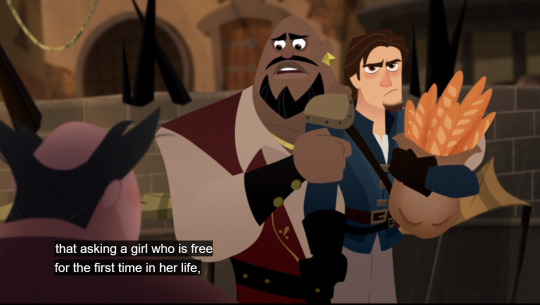
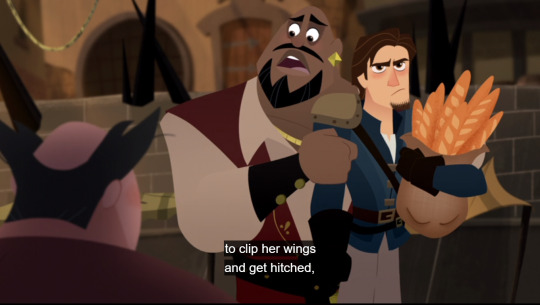
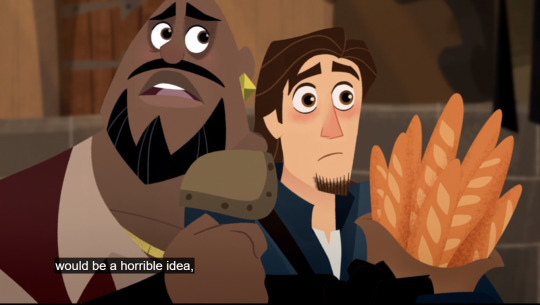
I wouldn’t mind this kind of talk so much if the show was using Lance and Hookfoot here to set up a later contradiction and challenge this kind of thought process. Cause as is, this is a pretty toxic and sexist mentality. Ladies are no less ‘free’ when they get married. Eugene doesn’t like own Raps just cause he becomes a husband. She can still do whatever the heck she wants. But no, the show only validates this outdated thinking instead.
Cass Deserves To Get Her Butt Kicked
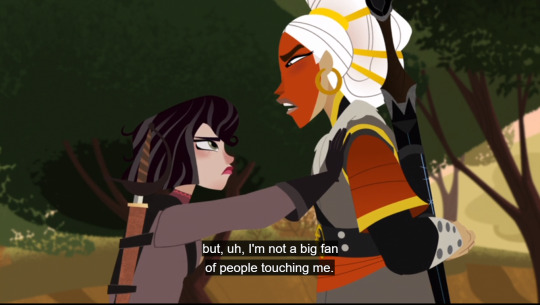
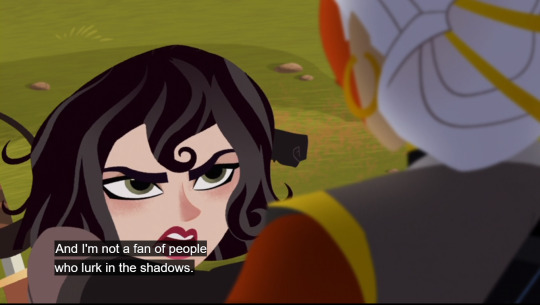
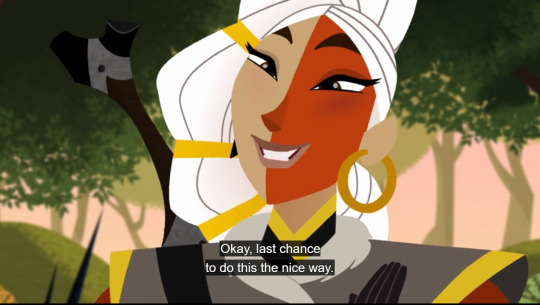
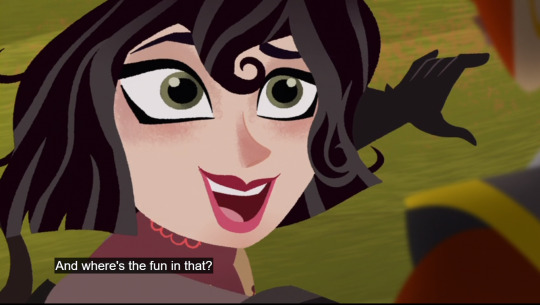
Can’t spell Cass without ‘ass’, hun?
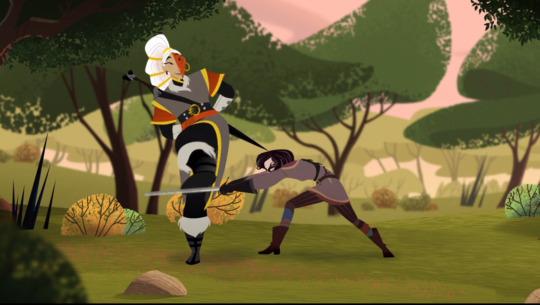
Adria doesn’t do anything here. She cheerfully asks to talk to Rapunzel alone, respectfully requests not to to have her personal space invaded more than once, and even then she tries to deescalate the situation as Cass tries to pick a fight over nothing like a school yard bully; even going so far as to shout elementary insults at her. Which Ardia takes all in stride.
If you’re wanting me to take Cassandra’s side in the Cass vs. Adria fallout later, show, then you’re doing a poor job of setting that up. Being cautious with a stranger is one thing, getting butt hurt after being rightly called out on your BS is another.
Let’s Talk About the Slap Here, and the Fans Misportrayal of Stalyan
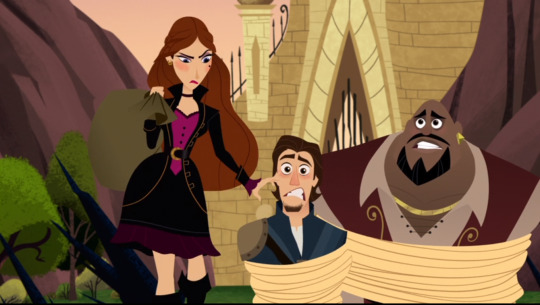
Most of the fanbase hates Stalyan, and rightly so. She’s not meant to be likable. She is a villian and the show portrays her as such. However, certain fans like to take things a step further than that and take scenes out of context to imply that she is somehow even worse than she actually is. Scenes like this one for instance.
Keep in mind, Eugene stood her up. He left her at the altar. As in, he didn’t have the decency to break up with her face to face like a respectful human being. The whole point behind Eugene’s character development is that he use to be a jerk.
I’m not going to act like Stalyan is a sweet and wholly innocent victim here, but you look me in the eye and tell me you wouldn’t slap your cheating ex too when you finally saw him again after that? And yes, it is implied that Eugene use to cheat on her. More on that in part 2.
The point is you can’t just shout ‘abuser’ when all you’ve seen of a relationship is the post break up. Cause you have no idea what went down, and people aren’t always friendly with their exes.
Now we most definitely should have gotten more info on what their relationship was like and more context around the break up, and that is a failing of the show. But a good chunk of the complaints hurled at Stalyan aren’t based off anything she actually did and is more rooted in sexism and fandom’s toxic shipping habits.
What you can rightly criticize Stalyan for is inconsistency.
Stalyan’s Actions Don’t Mesh With Her Motivations
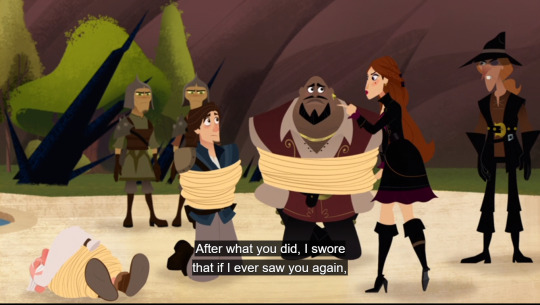
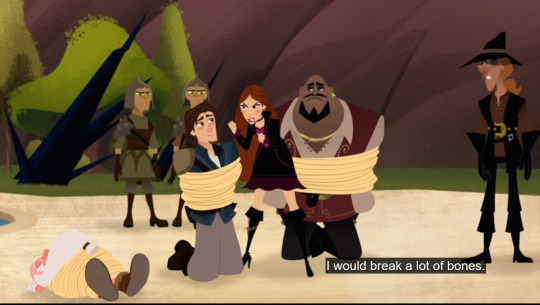
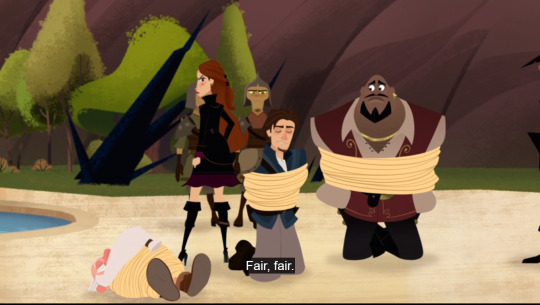
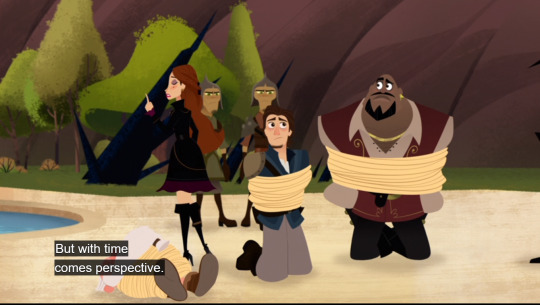
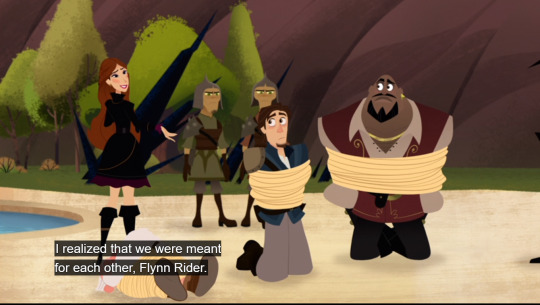
So does she want revenge or does she want to marry him? Which is it? Cause those two things aren’t compatible.
If she still loves Eugene and still believes that he would come back to her, than she wouldn’t be threatening him now. Like I said, marriage isn’t a trap. It’s not punishment. It’s a thing people actually want, and they want their partners to want it too. If her goal is to convince him to marry her, as stated, then she’d wouldn’t be mean to him right now and she wouldn’t be going along with this 'force him into it’ plan.
Look, this entire plot needed a rewrite. I’m not saying that you need to make Stalyan nice nor have her be wholly forgiving of Eugene’s past actions, but you really, really, needed to keep her in the dark about the blackmail. Especially since they try and fail to make her sympathetic later on.
As is, Stalyan is just a confusing character. You gotta do a lot of reading between the lines and digging for exposition (some of which we don't even get till the end of season 3) to make any sense of what she says and does.
But I’m going to give it an honesty try come part two.
Conclusion
I’ll give my finally thoughts in the second half of the episode/review. But for now the only interesting thing is Adria herself. The Baron stuff just drags and feels like a waste of build up.
66 notes
·
View notes
Text
Girl Genius - Looking Back
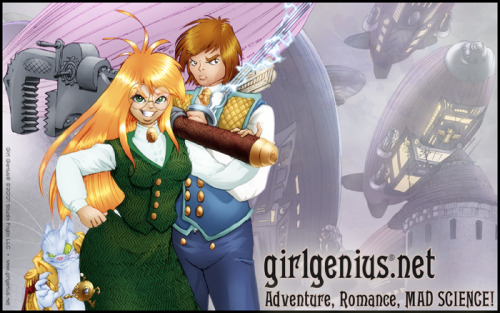
You know, I just noticed Krosp in in that image. What an odd character to put in a promotional image along Agatha and Gil, huh. Is that the pink airship in the background? I think it is.
Can you believe it? We’re not even halfway the content of this webcomic yet here’s the checkpoint in the middle of the road, so to speak. There’s a lot to be read, a lot many crazy events to witness...and it’s still being updated. Will I be able to reach the end of the content someday? Maybe. Hah, the end of this liveblog is still far away.
So what has been seen so far in this story? A lot of what was promised to me from the beginning, that’s for sure. MAD SCIENCE, mostly. It’s fantastic! The Foglios have a lot of originality in what they do, and I don’t think anyone reading the story can predict for sure what’s the next crazy thing that’ll happen. Machines, events, characters, they all come together and create bizarre happenings anyone reading this story will enjoy.
This webcomic isn’t like Homestuck’s extraordinarily convoluted story or like Scary Go Round episode-based format, it’s more linear and relies heavily on continuity, like a real book series. All the events seen build up to the next, that’s how it goes. It’s not strange for a volume to cover up a few hours of story – as seen during the Heterodyne arc so far. It has been...what, twelve hours at most since Agatha arrived? It can’t have been too long.
All in all, Girl Genius is a story with a lot of originality. It’s clever, I like the dialogue and the art, and so far it has been a joy to read. The steampunk setting and the sparks give the authors a lot of liberty to create whatever weird thing one can think of, and they have used this liberty stupendously. The madness of the mad science doesn’t overtake the story, what moves it is the characters’ motivations and goals. Agatha wanting to get to Mechanisburg after finding out she’s a Heterodyne, Gil wanting to protect Agatha, Tarvek’s own plans, the Baron’s control of Europe and trying to deal with the threat that’s the Other...how each one of these motivations tie together and form the story is Girl Genius’ strong point.
As to what’s its weak point...ummmm...honestly? Nothing comes to mind. I’m sure Girl Genius has flaws, but I can’t think of anything that bothers me or something I particularly dislike. That’s good, right? It’s a sign the Foglios are doing an excellent job with their webcomic. I guess the only thing I can complain about was the timing of a couple intermissions from before, but since said intermissions were funny and I liked them, I can’t really complain about it.
There’s something I feel I should mention and it’s that most of the story so far feels like...like the early chapters of something bigger, like everything I have read so far is the authors setting up the scenario for the real story. Agatha trying to claim the throne as a Heterodyne – so to say – the Other’s plans and worming into characters’ heads, Tarvek’s existence and potentially conflicting plans with both Agatha and Gil...it feels as if everything so far has been just a prologue. I don’t know how long the Foglios plan Girl Genius to be, but I’m at the end of the eighth volume and there are seventeen right now. That’s almost half of the available content. If something that could be considered ‘prologue’ lasts that long...well this really is bound to be an extremely long story by the time it ends! It’ll be years before it does, eh?
The problem I have when I like something so much is that it’s hard to think about what to talk about that isn’t gushing for seven paragraphs. Let’s see...what I can do...how about I take it easy, starting from the top?
Girl Genius started when Agatha Clay got her locket stolen right in the day the Baron and his son were going to arrive. The events that happened that day were the start of her adventures, as she finally was able to start using her spark tendencies. The first volume ended when she was taken to Castle Wulfenbach along with a rather stressed and furious Moloch, where she’d be used as leverage to convince Moloch to do what the Baron said. Yeah, those were the times when Moloch was the closest thing we had to an antagonist character and the Baron looked more reasonable than fearsome, hahaha. Oh, and Gil was there too, actually considering Agatha could be a spark. Did I imagine that was the beginning of something wonderful? Not really. At the time it was something new to read, and the setting was intriguing, but I didn’t really think it was something to praise to high heavens yet. My thoughts at that time must have been very different, since I’m sure they were 100% positive, but now that I think about it, it was just the beginning of Girl Genius. One can like what one sees at that point, but one shouldn’t decide yet if it’s a good story or not.
I think it was in middle of Volume 3 that this story truly gained the potential to be something extraordinary. Agatha learned her true heritage and everyone set to do what needed to be done with her, whether it was to try to have her as an ally, to help her, or simply to get rid of her before anything else happens. That was the turning point of this story and it was set up well. The references to the Heterodyne Boys’ stories were a good way to show that being a Heterodyne wasn’t a simple family matter, it was much more than that and it affects everyone.

And then she went to exist and cause trouble.
The circus arc was a way for Agatha to start growing as a person, I think. Zeetha and Krosp get introduced and assert themselves as characters, Agatha starts dealing with her spark in constructive ways, and generally there was worldbuilding in that time. Having to fake Agatha’s death was a move that helped Gil develop as a character in ways that made it clear he wasn’t going to give up on Agatha easily and that he was willing to go against the Baron’s wishes, while the Baron strengthened his will to deal with Agatha. At the time she wasn’t the Other, but she was a wildcard he needed to control before it caused trouble, especially if she got to Mechanisburg.
Then there’s the Sturmhalten arc. Tarvek is introduced and...hm, well, he’s steadily gaining importance since then. At that point he was just a minor player in the story. He was someone with his own schemes and plans, but overall it didn’t seem like he’d be capable of doing much due to Agatha, the Other and Wulfenbach himself. He still tried his best, though. That was also the time the Other was forced into Agatha’s head, and the main conflict of the story formed. Yeah, I think that’s the main conflict, how to deal with the Other. The Other is a threat that’s present in everything, and many important characters’ actions are focused on trying to hinder her. Will it be possible? Hah! Not really. There has been no sign of the Other herself so far, but Anevka got away and it’s always possible something will happen to Agatha’s locket. It took quite some time to introduce the Other as main antagonist for everyone in Girl Genius, but eh. It isn’t like it’s uncommon, apparently. Homestuck introduced Lord English as a big threat quite late, too.
The arrival to Mechanisburg and the whole thing with the false Heterodyne hint the Foglios have big plans. It’s political intrigue mixed with the fantastic steampunk Girl Genius has been filled with so far, and it works well! It’s also the point where Gil and Agatha will finally see each other face to face after so long. How long has it been? Very long. That’s where we are right now.
So far, yes, I have enjoyed Girl Genius a lot and I have high hopes for everything that remains to be read. I won’t repeat myself much in that regard, there’s only so many ways one can say one likes something, hah. Maybe I should close this by mentioning a few things about a few characters.
---
Agatha is an excellent main character. She’s proactive, she isn’t afraid of anyone – and even if she is she’d dare to defy them – and she’s very skillful. All in all, she has all the right elements of a main character. She showed a lot more doubts when she first found out she was a Heterodyne, back when she was travelling with the circus after having feigned her death, but since then, she has grown determined to show herself as a Heterodyne and claiming what’s her right. That all is what makes a reader want her to triumph and overcome all obstacles. So far she has done quite well! She got to the Castle, she managed to get accepted by it, and if she can fix it she’ll achieve great things and be able to fight Wulfenbach...no, defend herself and the town. Where’ll Girl Genius go from there? I don’t know. Could go anywhere.
Gil has interacted with Agatha much less than I thought he would. His character revolves around her, that much is certain, but he hasn’t interacted that much with her. I admit that it bothers me a bit that most of what he has done is related to Agatha in some way, though. It’s okay as motivation, but authors need to be careful with that. Nobody would want Gil to turn into a satellite character for Agatha, right? Gil is a good character on his own right, though, he has awesome traits and is someone who deserves respect. I like Gil.
Buuuut I admit that I’m more partial to Tarvek than to Gil, hah. Yeah, I appreciate manipulative characters. Tarvek doesn’t seem to like being manipulative, though. His loyalties were all over the place – I have a freaking alignment chart to record it, hahaha -- all was for his own goals and schemes, but I never had the impression he enjoyed doing any of that. It was more like doing what needed to be done, no matter how much he disliked it. I think he means good, though, I doubt he’ll hurt Agatha in any way. Maaaaaybe he can ruin her plans or inconvenience her in some way, but he won’t hurt her.
You know, I wouldn’t mind if Agatha ends with both of them as spouses. It wouldn’t be an easy arrangement and I’m sure nobody in Gil’s side or in Tarvek’s side would like it, but yeah, hahaha.
Wulfenbach is an intelligent person who definitely has what’s needed to keep control over Europe. He rules with a fist of iron! And now there’s this joker in the deck, Agatha is something he needs to deal with before things blow out of control. The fact that she seems to be the Other makes it more urgent, too. At this point Agatha should stay as far away from him as possible. He’s not in mood to listen or do anything that isn’t kill her or anything. There’s no way he’ll risk the Other taking over Europe. Something I like of the Baron is that he clearly loves Gil, wants him safe. Wulfenbach is not a kind person, but he appreciates his son and that’s fantastic.
Since those are the four main characters here, I think I’ll stop. There are many other characters worth naming, of course. Da Boyz, Zeetha, Krosp, Bangladesh, Zola...they’re all interesting, and I have great interest in seeing them as often as possible. However, I think it’s a bit too early to really say much about them. What did you say, that 100 updates have passed and that should be enough? Poppycock! The thing is that in the big scheme of things – in terms of spotlights – so far all of them are secondary characters, and compared to other people’s screentime, they’re not as notorious. Tarvek is the one that stretches consideration, but I included him up there because he’s shaping up to be a major player from his faction. That’s different.
I think that’s all worth noting I have to say for now? I’m having fun with Girl Genius and can’t wait to continue. Well, I can wait, but you get what I mean. See you in the next update!
Next update: seven updates
19 notes
·
View notes
Note
well said, ruben's apparent inner conflict seemed like a rich source of tension and drama, but yeah, i guess it was more a result of his rage-spawned emo persona? which could also be a fun idea, but in either case kind of underexplored - like you said, there's a lot that we have to read into here from the finale (e.g. kipperlily being the only person who wasn't killed and resurrected - an interesting reveal/twist that still feels like only a piece of the whole picture)
it's funny you mention the carlos thing because i just watched that this evening lol and i think you're totally right! though 5e can work for mysteries, it can't be too rigid or it's basically just un-interactive, which seems like an issue they ran up against here (e.g. the haunted mordred manor/baron encounter kind of coming out of nowhere due to an unexpected nat 20). this was something that impressed me about mice and murder, which still probably could've benefitted from a different system, but the theater of the mind / funhouse setting made it really conducive to just letting the players run around and figure out pieces in what seemed to be a fairly organic, adaptive order. generally a season i liked a lot, even despite the zoom setting (and the… infamous... ending)
agreed on the good balance of fanservice and independence/development - i think the whole fake triumphant final battle in the premiere really set the tone well for the season's relationship to callbacks, and while i missed them, i understood the choice to make gilear/ayda/aguefort basically AWOL for the season to make room for new NPCs. i'd have liked a little more detail to some of the bad kids' arcs, but the general ideas were solid, and the scope of the plot/this being a third season sort of necessitates them not having huge dramatic journeys on the level of the previous seasons, so all that made sense to me. i absolutelyyyy think a college years thing sounds more appealing than a full senior year season (or i think i've seen people floating the idea of like, jumping ahead to when they're like in their 70s which would also be fun) - either that or like, maybe make it like a 4-episode special? simple, tight, and wrap it up with a bang, calamity-style
seconding the endorsement of WBN but also totally understand your principle - i've had the same thought about prioritizing podcasts using other systems since i want to learn some and demo them with my group (my current project is Eidolon, which also has a great AP featuring the designers). are there any series you've particularly enjoyed that you'd recommend? (besides your streams, of course :) ) the big caveat with WBN is that you have to be psychologically down for intraparty conflict cause they really lean into that at times, and brutally so - otherwise, it's a rich world, almost fantasy novel-like at times, the audio production is great, they don't overuse rolling, and it's nice that it isn't limited by set design… but part of me still wishes it wasn't d&d. they're almost 30 episodes in and i think there have been 5 combats? if that? if that tells you how much they're engaging with the core rules of the system, haha
i've tried naddpod a couple times and bounced off, but more due to life stuff getting in the way than not liking it, and it still sits at the back of my mind as something to return to - do you feel like there are good starting places (besides the very beginning)?
starstruck is so, so good… what a fun mix of a really rich setting, the cast trying out new character types, and a story with enough flexibility that they could push it around without feeling too boxed in, and some truly unforgettable moments (battle of the brands forever, plinth forever). also features one of my favorite d20 quotes of all time - some moment at the Rec Station i think where UTP is questioning gunny and barry, who deny their knowledge of anything the party is doing, and brennan as this very professional npc is very politely like "alright then, thank you for your time, and um… get them? get them." just perfect combo of a archetypal villain line delivered so nonchalantly, it killed me. absolutely one of the best seasons for me too - if the cast were all up for it, i'd love a second season of it (maybe with some new PCs a la unsleeping city 2), but it's also nice as a standalone.
coffin run was a lot of fun, jasmine's aesthetics and presentation ruled, and i really like the short, focused seasons (and izzy and zac's interactions were golden). revisiting bloodkeep has been on my list forever, i think it was actually the first d20 season i tried after getting started with actual play shows via critical role c2 and i just found brennan's energy so intense that i dropped off - very funny to think about that in retrospect now having seen almost every season. totally feel you about ACOFAF (again, there were what, like two combats? why use d&d? the rumors and letters were the best part!) and i likewise wasn't the biggest fan of wuvvy other than when she helped stir the pot - for me it was so much more about the setting and the players' interactions than the big picture story for sure.
i'm unfortunately in the other camp for crown of candy, haha - there's so much to like and some truly iconic moments to be sure, but following up on the thread of like, the series' strength tends to be comedy, i think the comedy wasn't enough (for me) to balance out the atmosphere of like, continual dread and the players seemingly slowly getting ground down by it. i'd actually say i found it more psychologically gruelling than neverafter, weirdly enough. but that said, i'm glad they did it for the same reason i'm glad they did starstruck - branching out and pushing themselves to find new modes, and how can i turn away from the season that gave us "slammed down big style"?
finally finished the season and was curious if you had any thoughts on the junior year finale?
Yes! I watched it when it came out and I'm kind of bad at remembering what happens in shows, haha, but I do have some thoughts (these will probably be more "entire season" thoughts rather than JUST the finale thoughts).
Overall, I really enjoyed this season. It was really funny, and maybe one of the seasons I laughed at the most, and since I view Dimension 20 as a comedy show first, that's a big selling point to me.
I don't know how I feel about the down time mechanic. On the one hand, I think it's the only way they could have done this season, since it seemed like they were pretty set on it taking the whole year. On the other hand, there were quite a few rolls that Brennan said we'd come back to that I don't think were fully addressed (I could be wrong about how many, I'd have to go back and re-watch.) When they first introduced the mechanic, I thought it was basically a way for time to quickly pass while establishing how the school year was going, so each roll wouldn't involve too many scenes or roleplay, which I thought was smart. But then they did involve a ton of scenes and roleplay! So I have mixed feelings.
Similarly, it did feel like some things that could have been fun were underexplored because there was SO much jammed into this season, plot-wise. That's partially the medium of Actual Play, and partially being ambitious with how much they included. I love the idea of character foils or "dark reflections" of characters, and I wish we would have gotten a little more time with the Rat Grinders. We ended with a lot of implications about them, but I kind of wish there would have been a "this is what happened with them exactly" kind of moment. I guess they were all killed by Porter while on an adventure? Maybe I'm forgetting stuff and there was a more clear answer. I'm usually playing Power Wash Simulator while I'm watching Dimension 20 so sometimes I miss things.
Specific finale stuff! Gorgug and Unit and Gorgug and Mary Ann were both so funny. Zac is one of the funniest people alive. Brennan cannot keep his NPCs from flirting with Zac, and Zac cannot say no to a funny bit. I thiiiiink the finale was also the "Say it don't spray it" moment, which was incredible. Murph using Hold Person to take out Kipperlily was great, so tactical, so timely.
Maybe this is an unpopular opinion but I think the finale episode retroactively made the infamous "blimey" moment less funny. I wish Brennan wouldn't have gone back on having K2 destroyed. His rationale was that she actually did have access to Divine Intervention but also he gave advantage on the roll which isn't how the ability works, so I think having K2 be destroyed was fair and also really funny.
I was a little underwhelmed by the Bad Kids reactions to Ankarna's scenes with each of them. It felt like none of them knew exactly what was going on, and even though they had some good character moments, it felt muddled and I wasn't sure what was supposed to happen or honestly even what *did* happen there.
I liked Buddy's new god and Kalina showing up. I don't think she's evil, I think she just knows that Ankarna wants to kill her, so she's hitching her wagon on a new star.
Brennan said something during the final Adventuring Party about how if people would have laughed more at Gilear saying they were getting a dog that Fabian's mom wouldn't have been pregnant, which confirms something I've always thought! Obviously a lot of Dimension 20 is planned in advance because of the sets, but I've always felt like sometimes when things don't make sense it's because they decide something on the fly because it's funny. Even Porter being evil was decided because it would be funny (although that obviously wasn't decided on the fly). It makes sense why sometimes the pacing and plot of the shows are a little weird, because they're actual plays, and they're comedic APs at that. It's kind of heartwarming that it seems like even though they're making a show, they're all mostly just trying to make each other laugh, because if they make each other laugh, it'll probably make the audience laugh too.
Thanks for the ask! There's probably a lot of other stuff I thought that I've forgotten, haha. Would love to hear what you thought of the finale, too!
24 notes
·
View notes
Photo
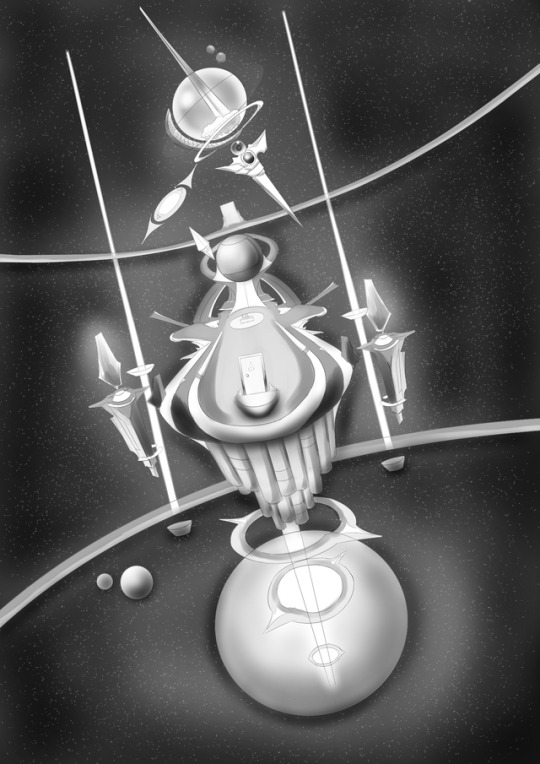
The Compass of Balance and Order
More concept art for Lustre Zeal. While attempting to try and develop the look and feel of the world the characters interact with I've also been trying to learn how to balance the aesthetics that I enjoyed while growing up with more modern sensibilities as copying the past because it was a simpler time won't necessarily make you a better artist. If anything it just makes you look dated. Also development log.
Development Log 7.21.17
So between working on various pictures and time spent trying to piece my psyche back together, apparently the development of the self and the deconstruction of the ego can be arrested at various stages in the individuation process leading to psychoses that I've no doubt Freud would have had a field day with, I've been developing a model of thought based on the nature of the Artistic Identity, the use of Inner Vision and our relationship to the social forces present in Emotional Economies to achieve what Jung would term 'a level of psychic functioning' that allows me to 'try and reach for an idea' without relying on the Extension of Self, Embodied Presence, the Avatar State, or the Panopticon Effect.
Don't know what any of those things are? Good, that saves me the trouble of trying to explain them because doing so would involve talking about higher-order thinking and metastrategic knowledge and I don't feel like being here all day. Suffice it to say that the two most prevalent processes I've come across in terms of communicating the means by which an artist experiences the creative forces analogous to the ones they seek to convey is Method Acting and Stanislavski's System, and I don't think I need to tell you which is the one that I prefer. Or maybe I do because quite frankly Method Acting has some very scary side effects and has caused many an actor to come back as something other then themselves. Think Alia from Dune when she gives Baron Harkonnen a place in her mind after speaking with him in other memory. Yeah, not pretty. Anyway back to talking about Artistic Identities and whatnot. Because working on Lustre Zeal has involved making so many freaking design decisions, I've lost count at this point as the sheer complexity of the processes involved has forced me to seek out even greater levels of organization then the one's I already rely on, I've had to focus more on a core set of techniques rather then my usual experimental and iterative explorations of various form languages. Good god that sentence was an absolute mouthful. Let's try that again shall we. Because I prefer to draw characters with more realistic looking anatomy and proportions, I've had to focus on things like the Reilly Method of drawing for my use of construction, gesture drawing for establishing the pose, Frazetta's Emotional Core for my relationships and blah, blah, blah for everything else. Seriously, do you think I'd actually sit here and list off every single artist, actor, animator or director whose work that I've studied in order to form the very foundation that I reach for when I sit down to draw? Well, I could, but it would be a fairly long list and a lot of the names would be Japanese so let's just stick with the whole Artistic Identity and whatnot as the degree of knowledge involved in achieving the level of realism I desire is fairly high and requires an obscene amount of investment in terms of time and energy to actually learn. Having said that, because of the desire to establish one's self both emotionally and mentally is a process of self-actualization, I figured that something similar must be happening whenever artists sit down to draw, writers write or musicians compose, if not only because such an identity allows us to establish our own individual presence in an Emotional Economy but because it also allows us to recognize the visual appeal of our work as well as further understand and define the form language we use to communicate our ideas with both our audience and our peers. A matter which is not helped much by the fact that the rites of passage artists undergo and the harrowing that we experience while setting out on such a path tend to have the unfortunate effect of either destroying our egos utterly or leaving us completely disillusioned by the nature of the realities we choose to engage with. The fact that I scare the absolute shit out of most people when I talk normally is something I've had to live with my entire life, so imagine my surprise when the art that I sought to create and the stories I started to tell became a reflection of the self I'd long sought to hide in order to pass off as normal. I don't doubt Jung would refer to that as the Shadow seeking to express itself in an otherwise healthy way, but then again my pursuit of finding my own Self amidst the ruins of a life ruled over by the fear of what others cannot possibly imagine has been motivated more by a desire to end such intellectual isolation then anything else. Anyway, as an Artist and a Writer I have the freedom to act and think as I want without hindrance or restraint, but balance that with the need for a Persona which to embody and the need for an Artistic Identity becomes both an ego defence mechanism and a means of self expression. There are of course countless downsides to this as dissociation and supplantation can and do occur, watching that happen to celebrities is disturbing to say the least, but then knowing the risks lessens the dangers so there is that. That said the purpose that I had in seeking out the concept of the Artistic Identity was because I wanted a way to discuss the idea of developing one's own Inner Vision without having to rely on the words 'feeling' or 'style' due to the incredibly vague connotations already associated with their use. Seriously, I hear those words used to describe everything related to art and it just grates against my mind because of how hollow and meaningless they are because if Art Deco is a style then no matter how much I may love it it isn't my 'style' its a style that I 'identify' with. Don't even get me started on 'feeling,' hoo boy, sensation is a much better word because not only can I externalize the concepts involved, I can internalize the information being gathered without harming my psyche in the process. But back to what I was originally saying, if we have an Internal Monologue, which can only be reported to exist as I know of no actual means by which to prove it exists save for maybe some form of telepresence or mind to machine transfer system, which in turn begs the question of machine learning and machine consciousness, it stands to reason that we also possess some form of Inner vision. By definition that would mean that if an Internal Monologue is about thinking in words, then Inner Vision is about thinking in pictures. Oh screw trying to dumb it down, there's a mode of meditation used in Vajrayana Buddhism that uses fully realized forms and sophisticated visualization techniques to create art. The fact it can also be used to achieve a substitution effect using imagined experiences that evoke the same cognitive and phsyiological consequences as their corresponding real world counterparts is in my mind an unintended bonus. Though not one I would personally prefer to try and teach someone as you can see by anything I try to draw, its a process that leaves little room for error and can seriously mess you up if you aren't aware of what the hell you're doing and what's going on. Seriously, ten years spent practicing a technique to achieve what people can experience in five minutes after eating a handful of mushrooms. Grumble, grumble, grumble . . . anyway, in order to differentiate one's own Inner Vision from, say, Mental Images or Mental Representation, its important to begin by distinguishing the idea of Inner Vision from the mathematical models and the spatial awareness skills we use to visualize objects as when attempting to represent an imaginary object rather then say, trying to recollect an object from memory in order to construct it, we rely on different visual processes to access and interact with the information in question. Which is to say that copying, transferring, transposing and transubstantiation all describe varying levels and degrees of the qualities we wish to ascribe to an object or form. Or in other words a sword can change its appearance to match its setting without altering its basic properties and still be recognized as a sword in spite of the differences between the artist's mental image of a sword and the way it appears in their own Inner Vision. And if that sounded confusing try applying the concept to architecture and you'll start to understand why so many artists default to the known forms that they've grown up with if only because doing so prevents them from experiencing the kind of trepidation and fear that comes from crossing through Liminal Space. Even I struggle with that one as the number of social constructs and intergenerational gaps that have created new and unprecedented chilling effects increase I find myself wondering what fresh new hell the masses have decided to pass off as popular opinion and commonly held belief. But then again the conflict that exists between attempting to establish one's own identity by rejecting the value systems of those who came before and the realization of one's own agency in a vanishing world is nothing new, its simply happening much faster now. Anyway, back to my point about developing one's Inner Vision, when we look for the primary influences that serve as the basis for the way we attempt to visualize objects, I found that focusing on those experiences that serve as our introduction to a work tend to form the foundation we unconsciously reach for when we draw as not only do they often have largest amount of emotional investiture but the degree of familiarity with the subject matter cannot be matched by the increasingly complex mental and emotional needs imposed upon us by the realities present in an adult world. Or in other words, the reason why the things we enjoyed as children absorbed us so completely is because the fabric of the social realities they presented us with served as a means of translating the elaborate social constructs of the adult worlds around us in a way that allowed us to relate to the events and forces that were shaping the geopolitical landscape of the time. The reason that I say this is because when I look back at many of the cartoons I grew up with I find myself seeing references to things that only those of us who were adults at the time would've recognized or even cared about. And this is in no way an isolated phenomena as not only is it present in my own work, but a few of the more recent cartoons that I've seen seem to be trying to reach a point where they appeal to both children and adults in a way that encourages parents to watch them with their kids so something to root for I suppose. That said, whenever I try to reach for an image in my mind that fits the parameters I've set in terms of design, I've found that comparing and contrasting it against things that already exist in reality is the only way to anchor the idea in a tangible way as asking myself to try and direct my own attention towards a certain emotion, theme, mood or even concept is all but impossible without associating my intent with some other established work. I suppose if I were to try and put it into words, its basically the difference between drawing, designing, and development. When I draw, I work from memory, when I design something I work from either an emotional intent or a previously established concept, when developing a novel or an illustration, I work with either a composition in mind or a set of parameters that in turn serve to define the work. Case in point when trying to visualize the Tower of Zeal I needed something that was simple enough to draw over and over again, and yet different enough from the rest of the surrounding architecture that no one would ever mistake it for having been built by the local population. Seeing that in my own mind on the other hand meant I couldn't rely on simply trying to copy pre-existing objects or styles even though doing so helps to familiarize us with the form language that human's use to try and express concepts like reverence and worship. That and ornamentation, people love ornamentation to the point that it is rare to see a truly blank surface anywhere in art or architecture. Anyway, I think that's enough rambling from me. As I said I'm still trying to develop the concept of the Artistic Identity and the function of Inner Vision so if I'm even less coherent then usual that would be why. Until next time folks, have a good one.
0 notes